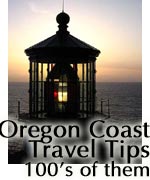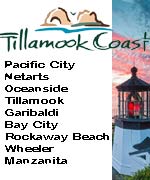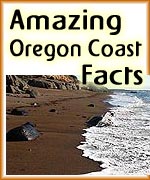 |
Shooting Stars Make a Growing Show in Oregon Skies
Published 08/06/2012
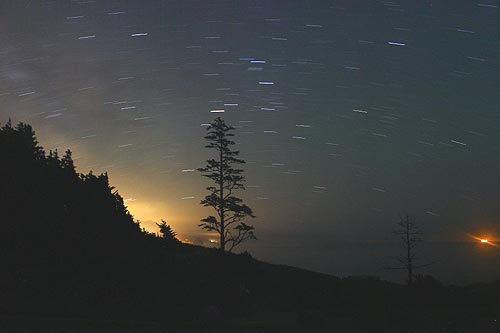
(Oregon Coast) - The peak of the big meteor showers of the year is just days away, and OMSI will host two viewing parties of the stellar phenomenon on August 12 in the Columbia Gorge and the Oregon coast range. (Above: star viewing at Cannon Beach)
The Perseid Meteor Showers have technically already begun, happening as the Earth enters the debris path left by the comet Swift-Tuttle. Earth starts entering this field in late July and finally leaves it around August 18, but the peak is expected to happen on August 12, resulting in a predicted 40 – 60 meteors per hour that will be visible. OMSI planetarium manger Jim Todd said the exact time of the peak is difficult to completely pin down, so viewing it a few days before or after should yield some nice streaks across the sky as well.
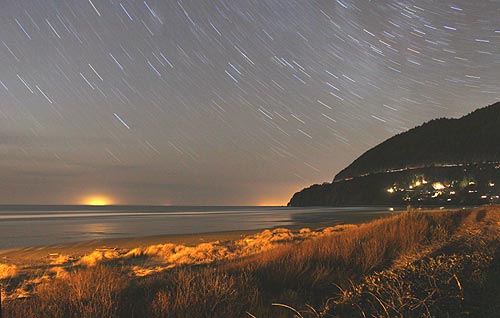
Manzanita
“Swift-Tuttle follows a highly eccentric orbit around the Sun with an orbital period of about 130 years,” Todd said. “The comet last passed by the Earth in December 1992.”
Todd scientists estimate that the rate for this year's Perseids should be around 60 per hour for those under very clear skies, such as in rural areas (which, given weather conditions, could very well be the Oregon coast). Those under dark but hazy skies should still be able to see 30 to 40 Perseids per hour. Those under urban skies will be lucky to exceed 10 to 20 per hour.
“Fortunately, this year will have the waning crescent moon on August 12 and will be a nonfactor for viewing the fainter meteors of the Perseids,” Todd said. “While viewing the Perseids, we will look at the close pairing of Saturn and Mars and later Jupiter.”
That's not the only really out-of-this-world attraction that night.
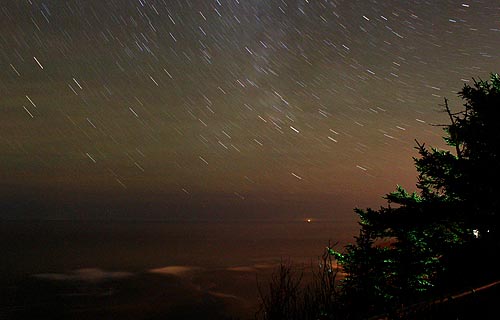
Cape Foulweather at night
“As a bonus, the International Space Station will be visible on the same night,” Todd said.
Todd said the coming week will see a slow build-up.
“It is possible to spot five Perseids per hour at the beginning of August and perhaps 15 per hour by August 10,” Todd said. “The Perseids rapidly increase to a peak of 50-80 meteors per hour by the night of August 12/13 and then rapidly decline to about 10 per hour by August 15. The last night meteors are likely to be seen from this meteor shower is August 22, when an observer might see a Perseid every hour or so.”
Meteor showers are named for the constellation from which the streaks appear to come from – a spot in the sky that astronomers called the radiant. This meteor shower gets the name "Perseids" because it appears to radiate from the constellation Perseus.
These shooting stars are created by small bits of interplanetary rock and debris called meteoroids crashing and burning high in Earth's upper atmosphere. They travel at thousands of miles per hour and quickly ignite in the friction of the atmosphere, some 30 to 80 miles above ground.
OMSI suggests sticking to rural areas to best see the showers. Eastern Oregon is often the clearest at night, but a close runner-up would be the distinctly unpolluted skies of the Oregon coast – if weather conditions permit. Excellent spots for viewing these stellar streaks along the coast would be the dark, high vantage points, like those south of Cannon Beach, Neahkahnie Mountain by Manzanita, Anderson's Viewpoint near Oceanside, Cape Foulweather near Depoe Bay, and the myriad of pullouts just south of Yachats.
The OMSI Star Parties will be held on the night of August 12 and into the early morning of August 13.
Hundreds of star lovers from across the Pacific Northwest will be meeting at both Rooster Rock State Park and Stub Stewart State Park at 9 p.m. to watch and enjoy the wonder of the Perseid Meteor Shower. The event, sponsored by OMSI, the Rose City Astronomers, the Vancouver Sidewalk Astronomers and Oregon Parks and Recreations will have telescopes set up for attendees to use. OMSI staff will be presenting informal talks about the meteor shower, constellations, and the summer sky. The event is free, and there is a $5 per vehicle parking fee for public. For possible weather cancellation, call (503) 797-4610 on August 12 after 4:00 PM to get the latest information.
Keywords: astronomy, Pacific City, Cannon Beach, Yachats, Depoe Bay, Newport, Lincoln City, Oceanside, Astoria, Oregon coast, science.
More About Oregon Coast hotels, lodging.....
More About Oregon Coast Restaurants, Dining.....
 |
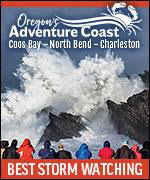 |
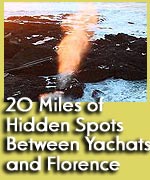 |
LATEST OREGON COAST NEWS STORIES
Oregon Coast, Valley and Likely Washington Coast to Get Some Aurora Borealis ... |
Back to Oregon Coast
Contact Advertise on BeachConnection.net
All Content, unless otherwise attributed, copyright BeachConnection.net Unauthorized use or publication is not permitted
Secrets of the Season |
Unusual Travel Articles TravelParanormal.com allows you to submit your own creepy tale or debunk one - or see up-to-the-minute news headlines about travel and the paranormal. News Headlines from All Over Oregon Need to scan Oregon headlines? Constantly updated news from all over Oregon: a comprehensive, up-to-the-minute display of news headlines from a variety of media |









